Turnips
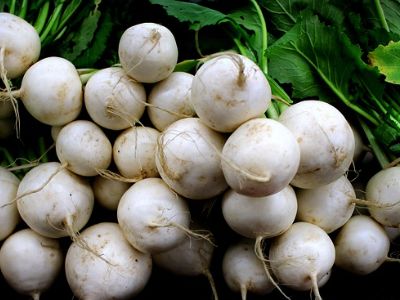
Preparation: Step-by-Step
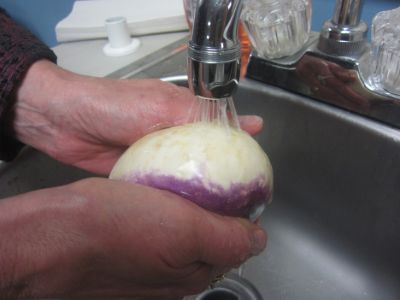
Wash hands. Thoroughly rinse tomato in cold water to remove any dirt.
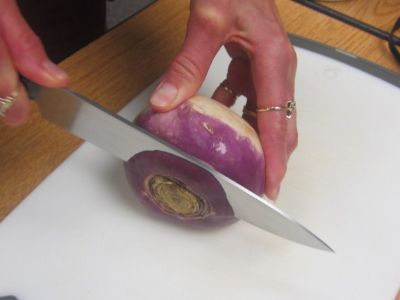
Remove stem by slicing tomato in half with a sharp paring knife, then make a diagonal cut on both sides of the stem.
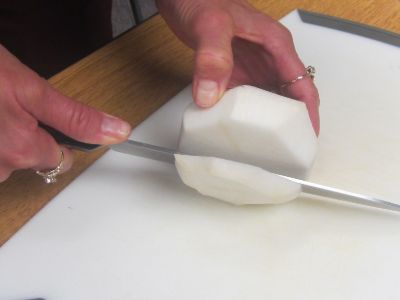
Hold one end of tomato and slice the other end with a sharp knife to desired thickness.
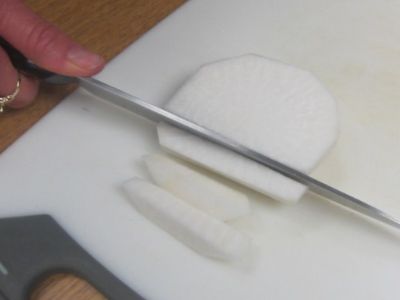
Cut slices again to dice to desired thickness.
Grow.
- Grow.
Plant seeds in spring. Soil temperature can be as low as 40°F. Sow seeds ¼- to ½-inch deep, one inch apart, in rows 12-18 inches apart. Thin to 4-6 inch spacing. Plant in full sun and water 1-2 inches per week.
For more growing information, look for the MSU Extension MontGuide: Planting a Successful Home Vegetable Garden, or contact your local MSU Extension office.
Harvest.
- Begin harvest when turnips are one inch in diameter or larger. Harvest can be late into the season as turnips can withstand several light freezes.
- Choose young, small bulbs: they are the most tender. Overgrown turnips are sharp in flavor and tough and woody in texture. They should feel firm and heavy with crisp green tops. Check for a sweet aroma. Turnips are generally white at the bottom with a light purple blush on the top of the bulb.
- Store turnips in a vegetable crisper where it is cool and moist for only a few days. Longer storage will make turnips bitter.
- Most vegetables are rich in fiber but provide negligible amounts of saturated fat, trans fat, cholesterol, and sodium and are gluten-free. Turnips have only 17 calories per half-cup serving and are rich in Vitamin C.
Bake.
- Most vegetables are rich in fiber but provide negligible amounts of saturated fat, trans fat, cholesterol, and sodium and are gluten-free. Turnips have only 17 calories per half-cup serving and are rich in Vitamin C.
Boil or Steam.
- Slice turnips into 1/2- to 1-inch pieces and place into steamer or pan of boiling water. Steam or boil about 15-20 minutes or until tender. Boil uncovered to allow the bitter gases to escape. After boiling or steaming, add turnips to casseroles or blend with potatoes.
Microwave.
- Cut turnips into quarters or one-inch pieces and place them in a microwaveable dish with two tablespoons of liquid. Cover with a lid or vented plastic wrap. Microwave on high for 4-6 minutes or until tender.
Raw.
- Cut smaller turnips into 1/4- to 1/2-inch slices and eat raw, or add to a salad, slaw or a vegetable tray.
Roast.
- Chop peeled turnips into quarters, place in plastic bag and shake with olive oil to coat. Spread coated turnips on a pan to roast at 425°F for 20-30 minutes, or until tender.
Sauté.
- Warm pan to medium to medium-high heat, add butter or oil to coat bottom of pan, then add diced 1/2- to 1-inch pieces of turnip. Stir turnips to produce even browning. Sauté about five minutes, or until tender.
Season.
- To enhance the flavor of turnips, use garlic, coriander, cumin, chili powder or cardamom.
Preserve.
- For more information on preserving vegetables, view these MSU Extension MontGuides: Freezing Vegetables and Drying Vegetables. Or contact your local MSU Extension office.
For More Information:
Montana State University Extension: msuextension.org
MSU Extension Master Gardener: mtmastergardener.org
MSU Extension Food and Nutrition: nutrition.msuextension.org
MSU Extension Nutrition Education Programs: buyeatlivebetter.org
Date of Publication: January 2014
